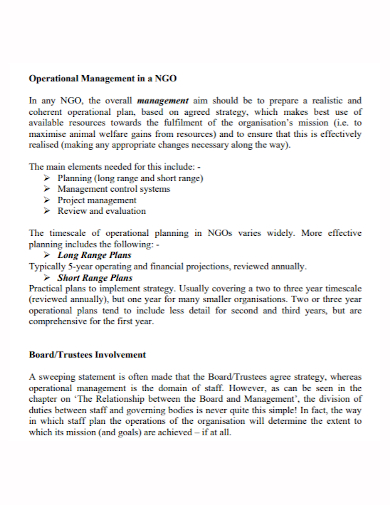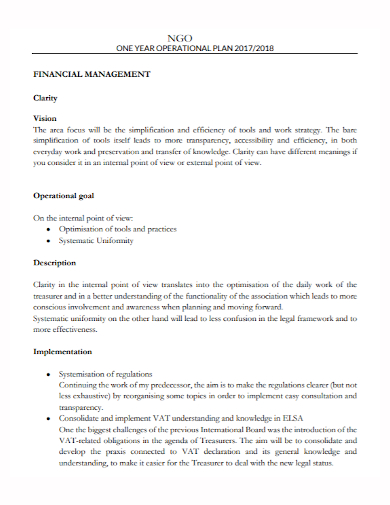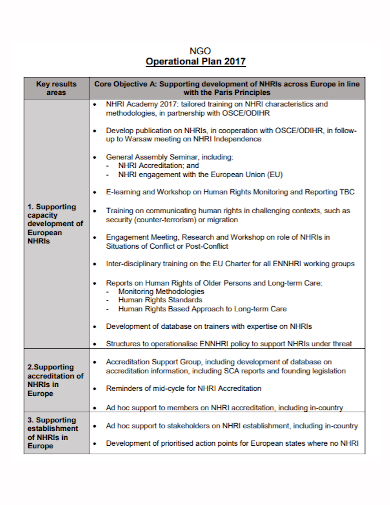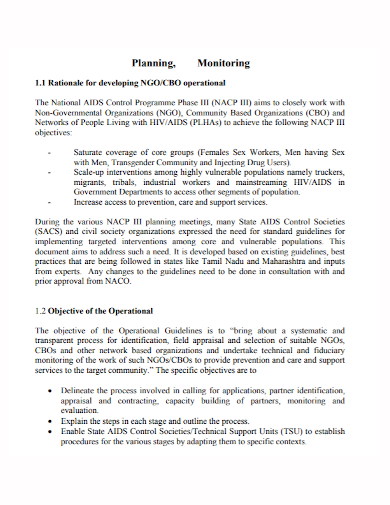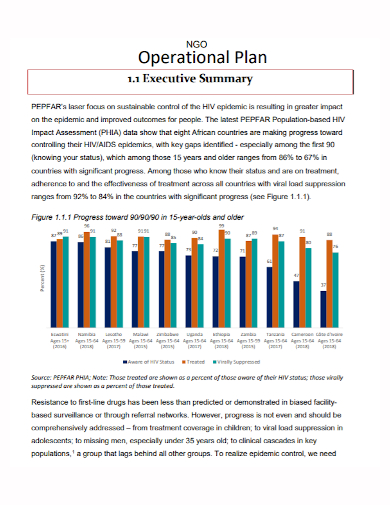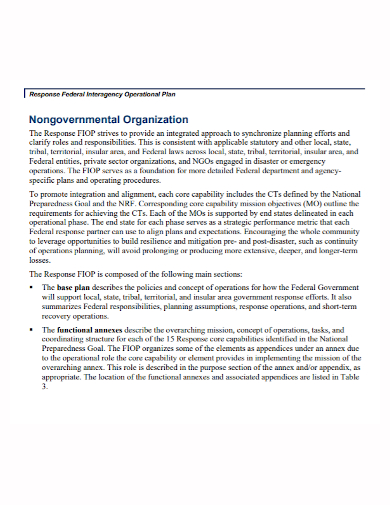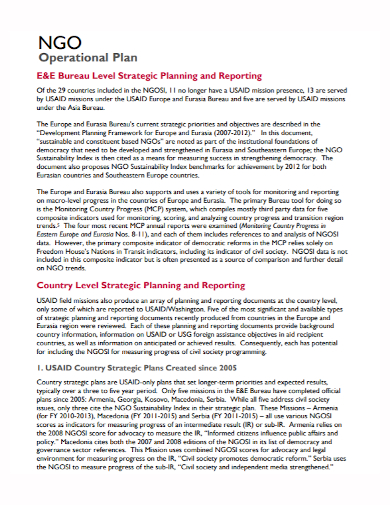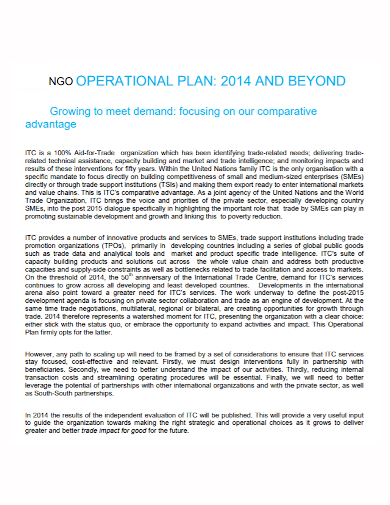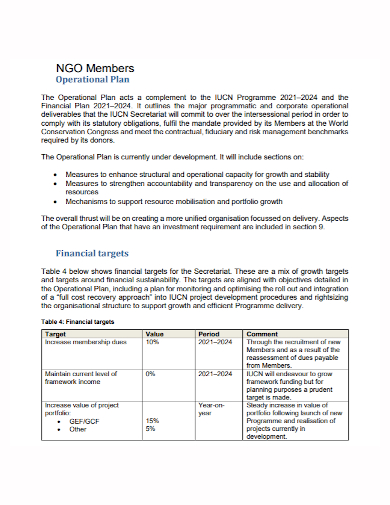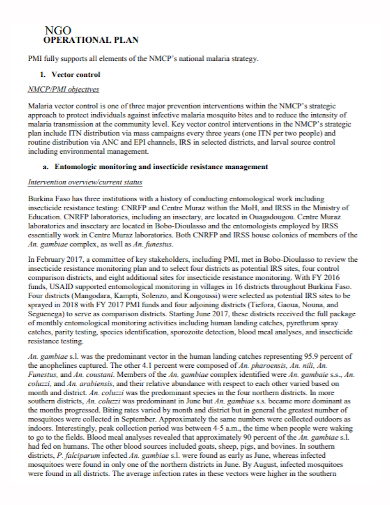The most effective operational plans have a clearly stated goal that everyone in your company is working toward. As a result, your operational plan will be a useful document for your investors. It can, however, benefit you and your employees by encouraging you to consider deadlines and tactics more carefully.
Answers to the following questions should be included in the operations plan: Who are the people and departments in charge? What are the responsibilities of each employee or department? Where will daily operations take place How much should each department be budgeted to complete these tasks? What are the deadlines for each task’s completion?
10+ NGO Operational Plan Samples
The majority of businesses agree that planning is an important part of good governance and management. Strategic planning is required by all entities to achieve success, whether they are a non-profit organization, a government agency, or a private corporation. Most organizations create their own operational plan, which is a document that outlines an organization’s goals and objectives, as well as the necessary steps and actions to achieve those goals and other important elements that emerge during the planning process.
1. NGO Operational Plan Template
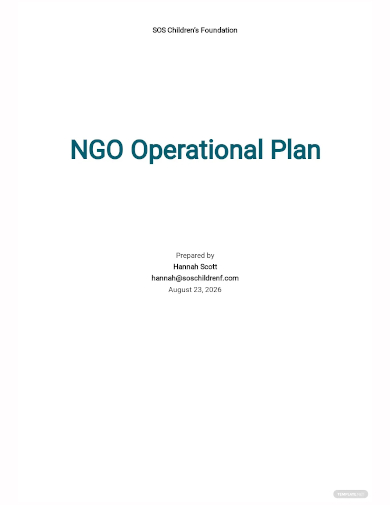
2. NGO Operational Management Plan
3. NGO Financial Operational Plan
4. NGO Operational Plan
5. NGO Operational Monitoring Plan
6. NGO Executive Operational Plan
7. Sample NGO Operational Plan
8. NGO Operational Strategic Plan
9. Standard NGO Operational Plan
10. NGO Members Operational Plan
11. Basic NGO Operational Plan
Creating a Strong Operational Plan
- Develop a Strategic Plan: Before you start working on an operational plan, you should have a solid strategic plan in place. The operational plan is the road map for achieving your strategic goals.
- Prioritize Your Objectives: The more straightforward a business plan is, the more likely it is to succeed. Prioritize your goals and focus on the most important ones to avoid creating an overly complicated operations plan. Concentrate on three to five initiatives that are likely to contribute to your long-term objectives, and then create metrics to track your progress.
- Use Leading Indicators: Selecting the right key performance indicators, or KPIs, is critical. Leading indicators, or predictive measurements that help you project into the future, are more useful than lagging indicators, or historical measurements because they allow you to make changes as you go.
- Draw on Your Organization: The KPIs you select will be a critical part of your organization’s work for the next year. Rather than developing them in a vacuum, you should try to incorporate as many perspectives as possible from your team. For example, to develop your KPIs, you could hold an annual planning session that encourages team collaboration and discussion. In an ideal world, you’d include enough diverse perspectives to strengthen the final product, but not so many that decision-making becomes unwieldy.
- Communication is essential: It is critical that everyone in your organization understands why your KPIs were chosen, how they will help you achieve your goals, and what role each employee will play in achieving your stated goals. As a result, set aside time at the start of each year to share your KPIs with your entire organization and solicit feedback. Getting your team’s buy-in is crucial, and the importance of communication cannot be overstated for this reason. Furthermore, each employee should be able to track his or her progress toward personal KPIs, whether through a dashboard, regular meetings, or some other mechanism.
FAQs
What is the difference between an operational plan and a strategic plan?
The strategic plan serves as a general guide for managing the organization in accordance with stakeholders’ priorities and objectives. The day-to-day task and activities involved in running the organization are not mentioned in the strategic plan. The Operational Plan, on the other hand, does present highly detailed information in order to direct people in performing the day-to-day tasks required in the operation of the organization. The operational plan should be referred to frequently by management and employees as they go about their daily tasks.
What is the purpose of an operational plan?
The purpose of the Operational Plan is to give organization personnel a clear picture of their tasks and responsibilities in relation to the Strategic Plan’s goals and objectives.
Essentially, the Operational Plan is a roadmap for putting the Strategic Plan’s strategies into action. It’s a management tool that makes it easier to coordinate the organization’s resources (human, financial, and physical) so that the strategic plan’s goals and objectives can be met.
Related Posts
FREE 7+ Fashion Business Plan Samples in PDF
FREE 10+ Sprint Planning Samples In MS Word | Google Docs | PDF
FREE 10+ Wedding Planning Samples in MS Word | Apple Pages | Powerpoint | PDF
FREE 9+ Monthly Study Planner Samples in PSD | Illustrator | InDesign | PDF
FREE 9+ Sample Curriculum Planning Templates in PDF | MS Word
FREE 10+ Teacher Development Plan Samples in MS Word | Google Docs | Apple Pages | PDF
FREE 10+ Basketball Practice Plan Samples in PDF
FREE 12+ School Business Plan Samples in PDF | MS Word | Apple Pages | Google Docs
FREE 7+ Client Strategic Plan Samples in PDF | MS Word
FREE 11+ Trucking Business Plan Templates in PDF | MS Word | Google Docs | Pages
FREE 7+ Small Hotel Business Plan Samples PDF | MS Word | Apple Pages | Google Docs
FREE 14+ Bakery Business Plans in MS Word | PDF | Google Docs | Pages
FREE 4+ Yearly Lesson Plan Samples in PDF
FREE 50+ Strategic Planning Samples in Google Docs | Pages | PDF | MS Word
FREE 10+ Construction Project Plan Samples in MS Word | Google Docs | Apple Pages | PDF

